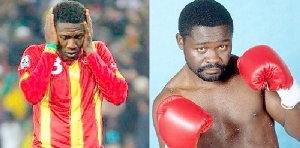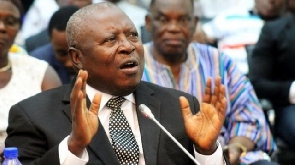As the sun set on Ghana in the 1990s and early 2000s, it cast long shadows; larger than life.
The newscasters of my youth, with voices deep and commanding, didn't just report events; they were the pulse of a nation brimming with pride.
Abedi Pele's graceful command of the football, Kofi Annan's diplomacy weaving through global politics, and Azumah Nelson's fists spoke of resilience — they were not just heroes; they were Ghana's beating heart.
During the colonial period, Ghana's soul was stirred by the likes of Yaa Asantewaa, a matriarchal figure of might and resolve, who stood defiant against British rule, her legacy a testament to the enduring spirit of resistance.
This spirit cascaded down to the architects of independence, with Kwame Nkrumah and J.B. Danquah at the helm, steering the Gold Coast into a new dawn as the sovereign nation of Ghana.
The echoes of their struggle reverberated through the decades, inspiring mass protests and the youth of the era who would one day assume the mantle of leadership themselves or pass it on to their progeny.
Yet, the current leaders, descendants of those once valiant fighters seem to stand at a remove from the fervent ideals of their forebears.
The once blazing torch of patriotism and selflessness appears dimmed in the hands of some who navigate the corridors of power today, prompting a collective yearning for a return to the ethos that once defined the nation.
Fast forward to today, from a place not bordered by the familiar horizons of Accra but by the sprawling expanse of a foreign land, I feel the distance from those golden days.
The reverence that once surrounded our heroes has waned, replaced by a cloud of disenchantment as economic hardships compel many to seek greener pastures abroad, myself included.
Reflecting:
Reflecting now, the 2006 World Cup qualification was a crescendo of national unity; it was as if each victory on the pitch healed a part of our collective psyche.
We revelled in the emergence of heroes who carried our flag with such vigour.
Yet, Asamoah Gyan's missed penalty in 2010 felt like a sudden jolt from a beautiful dream.
While it was but a moment in a game, it seemed to mirror a larger narrative within Ghana — the dwindling emergence of figures that stir the soul of the nation.
It's a poignant reminder of the ebb and flow of heroism in our cultural consciousness.
Intriguingly, this moment can be seen as a metaphor for the nation's contemporary struggle to cultivate new heroes.
Just as Gyan's penalty miss was an unexpected turn in a narrative of victory, Ghana's journey has been punctuated by moments of promise that have yet to fully crystallise into the emergence of new, unifying figures of admiration and national pride.
This poignant parallel between a sporting event and the socio-political fabric of a nation offers a rich vein for exploration in the broader context of the article.
Whispers:
The heroes of Ghana's past now linger as faint whispers from when their valour and sacrifice resonated deeply with a nation's soul.
These figures once stood as pillars of hope and unity, their stories a symphony that inspired a generation to dream of greatness.
Yet, today, their presence feels more like shadows than substance, a hollow echo in a reality grappling with dissonance and disillusionment.
Though a powerful initiative to reconnect with roots, The Year of Return amplifies this sense of loss for those within Ghana's borders.
It's as if the celebration of return for the diaspora underscores the departure of something intrinsic—a sense of belonging, of shared destiny—that once was taken for granted.
This psychological chasm has widened with the socio-economic challenges that prompt the youth to look beyond Ghanaian shores for fulfilment and opportunity, further eroding the feeling of connection to the land that once nurtured their forefathers' dreams.
As this generation looks around, the heroes they seek appear distant, and the legacy of past glories cannot mask the yearning for present-day champions.
It begs the question: How has Ghana, rich in history and accomplishment arrived at a point where the triumphs of yesteryear seem insufficient to galvanise the present?
The answer may lie in the complex weave of memory and reality, expectation and experience.
The psychological journey from independence to now has been one of navigating between the pride of past achievements and the pressing demands of current circumstances.
As the world has advanced, perhaps Ghana has struggled to keep the essence of its identity at the forefront, leading to a sense of drifting from the very ideals that once defined it.
Probe:
This probe into Ghana's current state is not merely a reflection but a call to rekindle the spirit of those who came before to draw from the well of history not just for nostalgia but for the sustenance needed to forge a new path of heroism tailored for today's Ghana.
The present socio-economic fabric of Ghana is woven with threads of uncertainty.
The youth, once buoyant with hope and political zeal, now watch with wearied eyes as the promises of change are buried under the weight of corruption and self-interest.
The political landscape, marred by scandal and inertia, starkly contrasts the days when leaders were symbols of integrity and progress.
Opinions of Wednesday, 21 February 2024
Columnist: Yaw Ofosu Asare



















